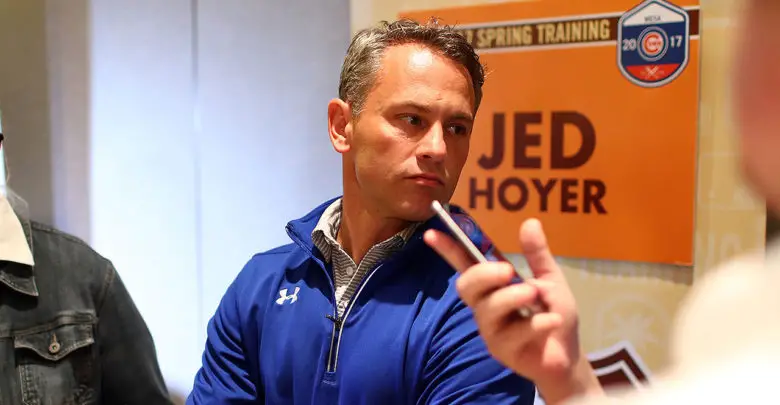
Jed Hoyer Explains How ‘Flat Hierarchy,’ Open Communication Fuel Cubs’ Success
There’s little I have enjoyed more about following the Cubs in the Theo Epstein era than the transparency with which they conduct their business. I mean, the winning is obviously the most fun, but I think you get that. Though they may not explicitly share every single move they’re planning on making, the members of this front office have always been very upfront about exactly what they intend to do. In that, it’s akin to a barbecue pitmaster giving you all the ingredients to his award-winning rubs and sauces.
But even knowing everything that goes into the recipe doesn’t matter if you can’t put it together in the proper quantities and at the right time. That’s why I’m skeptical when I see all these teams trying to copy the Cubs’ model for success, though I suppose some could be using that as a smokescreen for flat-out tanking in an effort to be more profitable.
That’s a whole ‘nother topic, though, so for now we’re going to stay with the Cubs and what has allowed them to be so successful. Despite the old adage that “too many cooks spoil the broth,” the Cubs have done so well precisely because they’ve established a collective brain trust of several bright baseball minds that are able to have input and impact on baseball operations.
“I’m sure we have some intern working for us that I’ll probably work for someday,” Jed Hoyer told Spiegel and Parkins. “I think that’s the way it should be. You should always hire people that can take your job and this game is ever-evolving and I think it’s important to remember that.
[Y]ou should always hire people that can take your job and this game is ever-evolving and I think it’s important to remember that.
“Our job is to bring in the best of the best of the next generation and someday those people will be running teams, and the Cubs, and there’s no point in fighting that. I think you have to embrace that.”
While that seems like the type of common sense approach that should be applied across all corporate structures, pride can be a mother. And I don’t mean that in the same way necessity gives birth to invention, but like the first half of a popular expletive. Most people don’t rise through the ranks without a great deal of ambition, which far too often results in hubris.
The Cubs, on the other hand, have turned their organization because of the humility of their front office. They understand that they don’t know everything and they’re not afraid to admit when they’re wrong. In fact, they’ve openly embraced the inherent challenges baseball presents and have allowed failure to guide them.
“I think it’s a sign of a good organization, being really comfortable being really publicly wrong about a few things and not caring how you might look or how it might come off or trying to be safe and perfect all the time,” Theo Epstein admitted during Tuesday’s Cubs broadcast. “I think in order to have any sort of breakthrough or advantage, you need to be comfortable being wrong.
“Baseball is an exercise in which we know we don’t have anywhere close to all the answers. We only understand a fraction of what goes on on the field in enough detail to be able to quantify it or predict it. So if you’re in a field where you know you’re gonna be wrong then you should embrace it and work really hard to chip away at finding a few things that you might better understand just a little bit, enough to give you an advantage that might manifest once or twice over the course of a season.”
The best way to do that, to chip away and find those little incremental improvements, is to crowd-source answers by empowering everyone in the organization.
“[Theo] creates a really flat hierarchy.” Hoyer explained. “Maybe that comes from Kevin (Towers, the late baseball exec whose own philosophy heavily influenced members of the Cubs’ front office), I’ve never really asked him if that was where he started it.
[T]he flatter a hierarchy we could create, the more we can foster all those good ideas.
“And we try to involve everyone because you realize that all these people spend all day thinking about baseball. They’re all really smart and they all have really great ideas and the flatter a hierarchy we could create, the more we can foster all those good ideas. And I do think we’ve created an environment where all of those people feel like they have a real stake and a role in us winning. It’s not, ‘You’re reporting through five different people to finally get to Theo.”
There you have it, folks, we can all feel to head on up to Epstoyer’s office after a few barley sodas at Brickhouse Tavern and tell them exactly how you feel about about their decisions. Oh wait, Hoyer mentioned really smart people with really great ideas. Guess that eliminates most of us, though we can still have a steak and a roll to celebrate the Cubs winning.
Even though I’m a little long in the tooth and a lot short on the knowledge required to be a part of that whole next generation thing, I really dig what the Cubs are doing. By seeking out new points of view and allowing their preconceptions to be challenged, they’re better able to map the vast unknown portions of the baseball world. That’s not only big for the immediate future, it’ll factor heavily when Epstein and Hoyer finally ride off into the sunset.
And not that I’m looking forward to that happening, but this all has me excited to see exactly where their successors can take the organization.
